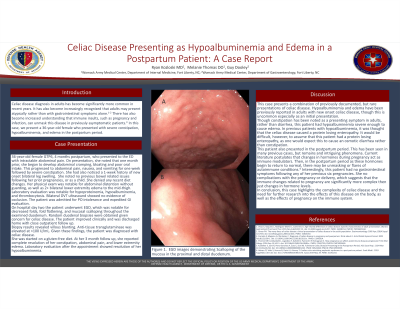Tuesday Poster Session
Category: Small Intestine
P5023 - Celiac Disease Presenting as Hypoalbuminemia and Edema in a Postpartum Patient: A Case Report
Tuesday, October 29, 2024
10:30 AM - 4:00 PM ET
Location: Exhibit Hall E

Has Audio

Ryan Kozloski, MD
Womack Army Medical Center
Fayetteville, NC
Presenting Author(s)
Ryan Kozloski, MD1, Melanie Thomas, DO2, Guy Dooley, DO2
1Womack Army Medical Center, Fayetteville, NC; 2Womack Army Medical Center, Fort Liberty, NC
Introduction: Celiac disease in adults has become increasingly recognized to present atypically rather than with gastrointestinal symptoms alone.1 There has also become increased understanding that immune insults such as pregnancy and infection unmask this disease in previously asymptomatic patients.2 In this case, we present a 36-year-old female who presented with severe constipation, hypoalbuminemia, and edema in the postpartum period.
Case Description/Methods: 36-year-old female G7P6, 4 months post-partum, who presented to the ED with intractable abdominal pain. On presentation, she noted that one month prior to presentation, she began to develop abdominal cramping and poor oral intake. This progressed to abdominal pain, nausea, and vomiting for one week followed by severe constipation. She had also noticed a 1-week history of new onset bilateral leg swelling. Her physical exam was notable for abdominal distention without guarding as well as 2+ bilateral lower extremity edema to the mid-thigh. CT scan demonstrated increased stool burden and bilateral DVT ultrasound was unremarkable. Laboratory evaluation was notable for hypoproteinemia, hypoalbuminemia, and thrombocytosis.
She was admitted and underwent colonoscopy which revealed internal hemorrhoids and an 8 mm sessile polyp, which was removed. EGD was notable for decreased folds, fold flattening, and scalloping of the mucosa of the entire examined duodenum. Random duodenal biopsies were obtained given concern for celiac disease. The patient improvement clinically and was discharged home with close outpatient follow up. Biopsy results revealed villous blunting and anti-tissue transglutaminase was elevated at >100 U/mL. Given these findings, the patient was diagnosed with celiac disease. She was started on a gluten free diet, with resolution of her hypoalbuminemia, lower extremity edema and constipation at three month follow up.
Discussion: This case presents a combination of previously documented, but rare presentations of celiac disease. Hypoalbuminemia and edema have been previously reported in adults with new onset celiac disease, though this is uncommon. Additionally, diarrhea is typically the presenting symptom of celiac disease, whereas this patient had constipation. This is rare especially with apparent protein losing enteropathy severe enough to cause hypoalbuminemia. Finally, Postpartum celiac disease is also rare, and is thought to be due to changes in sex hormones like other autoimmune diseases.3
Disclosures:
Ryan Kozloski, MD1, Melanie Thomas, DO2, Guy Dooley, DO2. P5023 - Celiac Disease Presenting as Hypoalbuminemia and Edema in a Postpartum Patient: A Case Report, ACG 2024 Annual Scientific Meeting Abstracts. Philadelphia, PA: American College of Gastroenterology.
1Womack Army Medical Center, Fayetteville, NC; 2Womack Army Medical Center, Fort Liberty, NC
Introduction: Celiac disease in adults has become increasingly recognized to present atypically rather than with gastrointestinal symptoms alone.1 There has also become increased understanding that immune insults such as pregnancy and infection unmask this disease in previously asymptomatic patients.2 In this case, we present a 36-year-old female who presented with severe constipation, hypoalbuminemia, and edema in the postpartum period.
Case Description/Methods: 36-year-old female G7P6, 4 months post-partum, who presented to the ED with intractable abdominal pain. On presentation, she noted that one month prior to presentation, she began to develop abdominal cramping and poor oral intake. This progressed to abdominal pain, nausea, and vomiting for one week followed by severe constipation. She had also noticed a 1-week history of new onset bilateral leg swelling. Her physical exam was notable for abdominal distention without guarding as well as 2+ bilateral lower extremity edema to the mid-thigh. CT scan demonstrated increased stool burden and bilateral DVT ultrasound was unremarkable. Laboratory evaluation was notable for hypoproteinemia, hypoalbuminemia, and thrombocytosis.
She was admitted and underwent colonoscopy which revealed internal hemorrhoids and an 8 mm sessile polyp, which was removed. EGD was notable for decreased folds, fold flattening, and scalloping of the mucosa of the entire examined duodenum. Random duodenal biopsies were obtained given concern for celiac disease. The patient improvement clinically and was discharged home with close outpatient follow up. Biopsy results revealed villous blunting and anti-tissue transglutaminase was elevated at >100 U/mL. Given these findings, the patient was diagnosed with celiac disease. She was started on a gluten free diet, with resolution of her hypoalbuminemia, lower extremity edema and constipation at three month follow up.
Discussion: This case presents a combination of previously documented, but rare presentations of celiac disease. Hypoalbuminemia and edema have been previously reported in adults with new onset celiac disease, though this is uncommon. Additionally, diarrhea is typically the presenting symptom of celiac disease, whereas this patient had constipation. This is rare especially with apparent protein losing enteropathy severe enough to cause hypoalbuminemia. Finally, Postpartum celiac disease is also rare, and is thought to be due to changes in sex hormones like other autoimmune diseases.3
Disclosures:
Ryan Kozloski indicated no relevant financial relationships.
Melanie Thomas indicated no relevant financial relationships.
Guy Dooley indicated no relevant financial relationships.
Ryan Kozloski, MD1, Melanie Thomas, DO2, Guy Dooley, DO2. P5023 - Celiac Disease Presenting as Hypoalbuminemia and Edema in a Postpartum Patient: A Case Report, ACG 2024 Annual Scientific Meeting Abstracts. Philadelphia, PA: American College of Gastroenterology.
